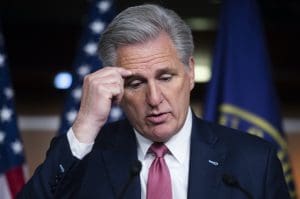No, COVID aid doesn't give 'free alcohol and marijuana' to the homeless
House Minority Leader Kevin McCarthy told this blatant lie in his quest to gin up opposition to Joe Biden’s popular coronavirus relief package.

House Minority Leader Kevin McCarthy on Sunday lied about the coronavirus relief package President Joe Biden signed into law last week, falsely saying that the $1.9 trillion legislation provides free alcohol and marijuana to the homeless.
“Did you know? — Nancy Pelosi’s Bay Area Bailout included $600 million for San Francisco, part of which goes to cover the tab for free alcohol and marijuana for the homeless,” McCarthy tweeted on Sunday, linking to a Fox News clip in which he makes the same false claim. “I’ve said it before and I’ll say it again: this bailout is too costly, corrupt, and liberal.”
This claim is patently false.
He appears to be talking about a program San Francisco started in March 2020 — at the start of the pandemic — when the city began housing homeless residents in hotels to stop the spread of the virus. As part of that program, the city is helping homeless residents with addiction programs by using “harm reduction therapy,” in which those battling addictions are given therapy to gradually reduce their use of those substances.
However, alcohol and marijuana is not purchased with taxpayer funds.
“These harm reduction based practices, which are not unique to San Francisco, and are not paid for with taxpayer money, help guests successfully complete isolation and quarantine and have significant individual and public health benefits in the COVID-19 pandemic,” the San Francisco Department of Health tweeted in March, after coming under fire for the practice.
McCarthy’s lie about the relief bill is part of a coordinated Republican effort to build opposition to the law.
Every single Republican in the House and Senate voted against the package — which authorized a round of $1,400 direct payments to workers earning under a certain income threshold, extended the $300 weekly Unemployment Insurance boost, and increased the amount of financial assistance Americans with children receive, a plan that will dramatically reduce child poverty in the United States.
So far, the GOP effort to vilify the bill has failed.
A CBS News poll released on Sunday found 74% of Americans approve of the virus relief package, as opposed to just 26% who disapprove of it. That’s on par with other surveys, including a Politico/Morning Consult poll published March 10, which found 75% support the virus relief bill.
McCarthy told Punchbowl News’ Jake Sherman on March 11 that the bill is only popular because people don’t know what’s in it.
Democrats, however, say they are not going to let lies about the relief bill stand.
Already, Democratic groups are spending millions to remind voters that every Republican voted against financial help for working-class Americans struggling from the virus’ impact on the economy.
And Democrats say they will continue running ads like that until the midterm elections in November.
“At the end of the day, we’re going to get this done for the American people and we will remind the people who stood up for them in their darkest times — and who did not,” Democratic National Committee Chair Jaime Harrison said earlier in March.
Recommended

Biden calls for expanded child tax credit, taxes on wealthy in $7.2 trillion budget plan
President Joe Biden released his budget request for the upcoming fiscal year Monday, calling on Congress to stick to the spending agreement brokered last year and to revamp tax laws so that the “wealthy pay their fair share.”
By Jennifer Shutt, States Newsroom - March 11, 2024
December jobs report: Wages up, hiring steady as job market ends year strong
Friday’s jobs data showed a strong, resilient U.S. labor market with wages outpacing inflation — welcome news for Americans hoping to have more purchasing power in 2024.
By Casey Quinlan - January 05, 2024
Biden’s infrastructure law is boosting Nevada’s economy. Sam Brown opposed it.
The Nevada Republican U.S. Senate hopeful also spoke out against a rail project projected to create thousands of union jobs
By Jesse Valentine - November 15, 2023















































































